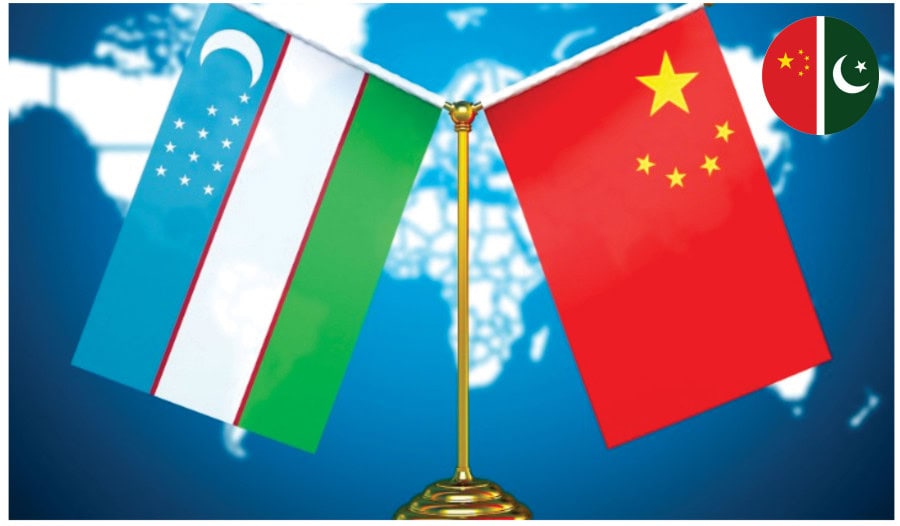The Belt and Road Initiative (BRI) and Uzbekistan have emerged as new strategic partners in Central Asia, further strengthening trans-regional connectivity, trade, investment and economic ties. Uzbekistan was the first among the five Central Asian countries to establish formal diplomatic relations with China. In June 2016, China-Uzbekistan relations were officially elevated to a comprehensive strategic partnership. By 2022, both nations reaffirmed their commitment to building a community with a shared future at the bilateral level. In 2024, they advanced this relationship into a new era of all-weather comprehensive strategic partnership. Uzbekistan’s geographic location is crucial, lying directly along China’s westward path toward Turkmenistan, a key supplier of natural gas. The Central Asia–China Pipeline passes through Uzbekistan, connecting Turkmenistan’s gas resources to China’s energy grid in the Xinjiang region.
Additionally, Uzbekistan’s proximity to the Caspian Sea makes it a viable corridor opening trade routes to the Persian Gulf and Black Sea ports. Uzbekistan itself also supplies a significant amount of natural gas to China as well as other commodities, including cotton and inorganic chemicals. Hence China-BRI-Uzbekistan is expanding caravans of trade and connectivity in the region and beyond.
Most recently, to further strengthen bilateral relations and the BRI partnership, Uzbekistan and China signed over 10 investment agreements during the second Uzbekistan-China Interregional Forum held in Samarkand on June 1–2. The event drew more than 2,800 participants, including government officials, business leaders and academics from both countries, reflecting the growing ties between the two nations. Among the agreements was a US$530 million package signed by the Namangan region with Chinese investors. The Navoi region secured a US$30 million deal with Hong Dau Ke Ji to build an oil refinery complex in the Karmana district, while Sichuan Chuahe Shengxin Electronic Engineering committed US$5 million for a shopping center in New Navoi and US$20 million for gold and silver mining projects.
In a major diplomatic and economic development, Uzbekistan and China have already launched a mutual visa-free travel regime starting June 1, 2025, allowing citizens of both countries to visit, enter and transit without a visa for stays of up to 30 days per visit. Hopefully this scheme of arrangement will further increase inflows of investment and joint ventures under the BRI in Uzbekistan.
Evidently, Shavkat Mirziyoyev’s foreign policy “promotes” modernization, openness and meaningful inclusion of Uzbekistan into global and regional integration processes. Uzbekistan actively participates and supports China’s BRI, has an observer status in the Eurasian Economic Union and strengthens economic cooperation with South Asia which are transforming its economic outlook and brightening its trans-regional connectivity prospects.
It seems that Uzbekistan’s opening of the 21 trading houses in more than 10 cities in China will further increase the export of agricultural products to China.
Since 2000, trade between Uzbekistan and China has surged, reaching US$13.1 billion in 2024, around 19 percent of Uzbekistan’s total trade turnover. It seems that the elevated strategic partnership, business-friendly policies, and visa-free mechanism have positioned Uzbekistan as an ideal destination for Chinese investments. Chinese companies have started to invest in sectors such as construction, consumer goods, agriculture and green energy.
It is a good omen that the number of Chinese companies in Uzbekistan has reached 3,467 in 2025 from 2,432 in 2024, surpassing the number of Russian companies. Chinese companies comprise around 22 percent of all foreign-invested companies that operate in Uzbekistan.
Uzbekistan has attracted over US$90 billion in foreign investment, an impressive figure for the region during recent years. Last year, its national economy grew by 6 percent confirming the effectiveness of these reforms.
The ‘Uzbekistan-2030’ strategy is an ambitious plan to turn the country into a regional economic leader with a GDP of US$200 billion. Foreign investment plays a crucial role in this vision, and the Tashkent Investment Forum serves as the main platform for dialogue between the government and business communities. At the previous forum, agreements worth a record US$26.6 billion were signed, demonstrating its importance.
Since 2022, total signed investment agreements have exceeded US$44 billion, with most projects either completed or underway. The most active investors come from Saudi Arabia, China, Russia, the UAE, and Turkiye countries bringing a variety of experience and technologies that complement one another. It bodes well that Uzbekistan’s government has invited investors to make investment in major projects across machinery manufacturing, automotive, energy, fintech, and even artificial intelligence.
Moreover, in 2024, Uzbekistan’s economy continued steady growth, with GDP reaching about US$115 billion, a 6.5 percent increase over the previous year. Investments played a key role, with nearly US$35 billion in foreign investment and loans attracted, and about US$26.4 billion directed to business development and new production.
In summary, it is evident that the BRI is going to revolutionize Uzbekistan’s economy, industries, productive channels, infrastructure development, rails, integrated transport systems, hybrid agriculture and holding of the 4th Tashkent International Investment would further symbolize the country’s commitment to openness, modernization, innovation and trans-regional connectivity. It is predicted that said forum will provide a unique opportunity for investors and government representatives to discuss plans and identify new areas for collaboration.
Uzbekistan is an investment “success story” because of the deepening of socio-economic reforms under the leadership of Shavkat Mirziyoyev and the 4th Tashkent International Investment Forum will mark another important step toward achieving ambitious goals and gearing a suitable business climate.
The writer submits that the policy makers of Uzbekistan should maintain a strategic balance maintaining strong economic ties with Beijing under the BRI. They should further promote openness in foreign investment transactions, especially in industries deemed strategic and aid local companies in reducing economic displacement.
The Asian Development Bank report (2025) clearly demonstrates a strong growth trajectory in Uzbekistan, with a focus on regional cooperation and the BRI. The high expectations of achieving a GDP growth of 6.6 percent in 2025 vividly reflect successful implementations of ongoing economic structure reforms in which the BRI will play a crucial role in enhancing connectivity, trade, and investment, contributing to Uzbekistan’s economic development.

















